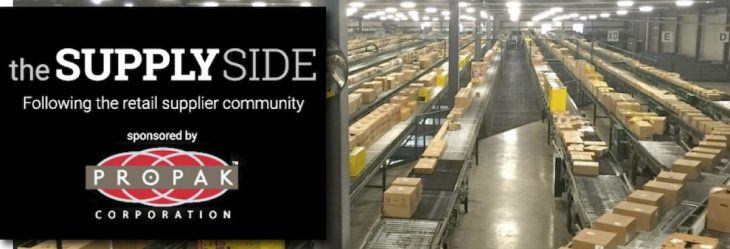The Supply Side: Walmart using ‘pop-up’ option to meet online holiday demand
by December 20, 2020 2:21 pm 914 views

Walmart is using “pop-up” e-commerce distribution centers (eDCs) to fill online orders to meet higher holiday demand. The pop-up space will be inside 42 of the company’s regional distribution centers that typically ship pallets of goods to stores, which is very different from the single packages disbursed directly to consumers ordering online.
PricewaterhouseCoopers recently reported 55% of consumers it surveyed are concerned about COVID-19 this holiday season, and 65% are afraid of catching the virus while shopping. The International Council of Shopping Centers estimates e-commerce sales will jump 25% this year amid COVID-19 concerns. That is notable, given e-commerce sales grew 13% last holiday season to $137.6 billion.
Walmart already has seen a huge jump in e-commerce sales during its second and third quarters, up 97% and 79%, respectively, from the prior-year periods.
“As we began our planning, we knew we needed to get creative to meet our customers’ expectations and continue to help them ring in the holidays in a safe way,” said Greg Smith, executive vice president of supply chain at Walmart.
The retailer already has an extensive supply chain network of distribution centers servicing stores. Smith said by leveraging new and existing technology, and using some of the real estate differently, Walmart can increase its e-commerce fulfillment capabilities as it prepares for the holidays. Srini Venkatesan, supply chain executive at Walmart, said the technology developed in-house is allowing the retailer to leverage more of its warehouse space to meet customer demand.
“We anticipate up to 30% of our holiday volume being shipped from our pop-up e-commerce DCs. A true transformation of our assets through technology,” Venkatesan said.
He said the move allows Walmart to continue the distribution of inventory to its stores but also enables it to add capacity to manage online order volume for the holiday season.
“Our Multi-Channel Sourcing Engine (MCSE) scans the entirety of our fulfillment network in less than a second and will assign orders to these eDCs when it determines they offer the fastest and most efficient option to fulfill the order,” Venkatesan said.
He said the process also improved pick times to avoid congestion in aisles with frequently purchased products as well as managing third-party fulfillment solutions in a single cloud-based integration platform. He said visibility was also enhanced into the entire fulfillment operations to meet promised delivery dates.
He said Walmart trucks can move online orders from the pop-up sites to stores for last-mile pickup from third-party carriers instead of shipping parcels from central fulfillment centers.
“We are getting a much more distributed footprint,” he said.
Walmart also said it is hiring 20,000 seasonal employees, specifically for its e-commerce fulfillment efforts in anticipation of spikes in online shopping.
“Working closely with our technology team, who developed and enhanced some of the existing supply chain systems, we have been able to increase our fulfillment throughput,” Smith said. “This means facilities that have traditionally supplied products to stores are now also equipped to fulfill online orders just in time for the holidays.”
Smith said standing up the eDCs enables Walmart to move products more quickly to customers, using its supply chain and tech employees without the delays of building new facilities. He said the flexibility to pop-up an eDC anytime the supply chain network experiences peak demand allows Walmart to deliver to customers on time for the holidays while also following the health and safety measures that have been in place for months.
Walmart President and CEO Doug McMillon said with the outbreak of COVID-19 the retail world clicked fast-forward, and Walmart’s ability to adapt quickly has been crucial.
“Changes in customer behavior have accelerated the shift to e-commerce and digital,” McMillon said during an earnings call Nov. 17. “We were well-positioned to catch and ride these waves given our previous work and investments. Our e-commerce and omnichannel penetration continue to rise, accelerating trends by two to three years in some cases. We’re convinced that most of the behavior change will persist beyond the pandemic and that our combination of strong stores and emerging digital capabilities will be a winning formula.”
He said Walmart also is using nearly 2,500 stores to fulfill online orders that allow the retailer to relieve pressure on the e-commerce fulfillment centers.
Scott Benedict, director for retail studies at Texas A&M University, said Walmart is smart to use the pop-up e-commerce DCs within empty areas of regional DCs. He said having products closer to the consumer is key to Walmart’s next-day or same-day delivery promises being done at a sustainable rate.
“With the launch of Walmart+ and the growth of e-commerce sales amid COVID-19, it’s important for retailers like Walmart to find ways to deliver online orders efficiently and effectively and using infrastructure they already have in place is smart,” he said.
Keith Anderson, senior vice president of strategy and innovation for e-commerce analytics firm Profitero, said reconfiguring existing assets to fulfill demand differently just makes sense.
“If you already have a network of DCs and can repurpose and retrain in time, it’s a great way to add flex capacity with minimal disruption to other channels’ operations. For fulfilling national demand, this probably is more efficient than picking from stores. That said, the perennial tensions around who does what and who gets credit for what is important to consider, and there needs to be an effort to help each part of the business [channels and functions] understand the role they’re playing.”
EDITOR’S NOTE: The Supply Side section of Talk Business & Politics focuses on the companies, organizations, issues and individuals engaged in providing products and services to retailers. The Supply Side is managed by Talk Business & Politics and sponsored by Propak Logistics.
